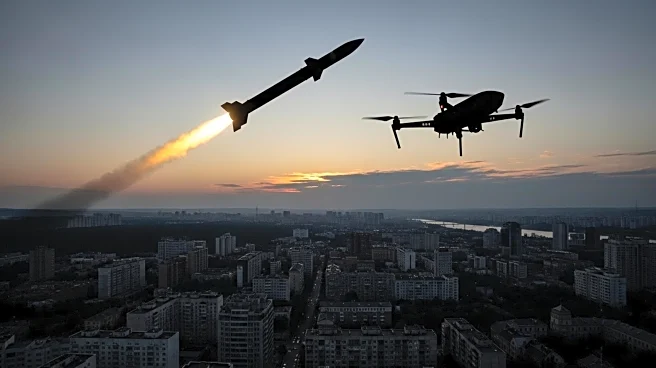What's Happening?
On October 10, 2025, Russia launched a significant missile and drone attack on Kyiv, targeting critical infrastructure and causing widespread power outages and water supply disruptions. The attack affected nine regions, including Kyiv, and resulted in injuries to at least 20 people, with a tragic death of a 7-year-old child in the southeast. The assault was described as one of the largest concentrated strikes against Ukraine's energy infrastructure since the war began. Ukrainian President Volodymyr Zelensky accused Moscow of attempting to create chaos by hitting energy facilities and railways. In response, Ukraine has intensified its own drone and missile strikes on Russian territory, which Zelensky claims are yielding results and increasing fuel prices in Russia.
Why It's Important?
The attack on Kyiv's energy infrastructure highlights the ongoing vulnerability of Ukraine's critical systems amidst the conflict with Russia. The disruption of power and water supply in the capital affects millions of residents and underscores the strategic importance of energy facilities in wartime. The escalation of attacks on infrastructure could lead to further humanitarian challenges and economic strain for Ukraine. Additionally, Ukraine's retaliatory strikes on Russian territory may exacerbate tensions and contribute to rising fuel prices, impacting both countries' economies. The situation underscores the broader geopolitical implications of the conflict, affecting regional stability and international relations.
What's Next?
As Ukraine continues to respond to Russian attacks, further military engagements and retaliatory strikes are likely. The Ukrainian government is expected to prioritize the restoration of damaged infrastructure to mitigate the impact on civilians. International stakeholders may increase diplomatic efforts to de-escalate the conflict and provide humanitarian aid to affected regions. The ongoing conflict may prompt discussions on energy security and infrastructure resilience in Ukraine and neighboring countries. Monitoring the situation closely will be crucial for anticipating further developments and potential shifts in the geopolitical landscape.
Beyond the Headlines
The attack on Kyiv's energy infrastructure raises ethical and legal questions about targeting civilian facilities during wartime. The destruction of essential services like power and water supply can have long-term effects on public health and safety. The conflict also highlights the need for international norms and agreements to protect civilian infrastructure in conflict zones. Additionally, the situation may influence global energy markets, as disruptions in Ukraine could affect supply chains and prices. The broader implications of the conflict may lead to increased international pressure on Russia and calls for peace negotiations.









